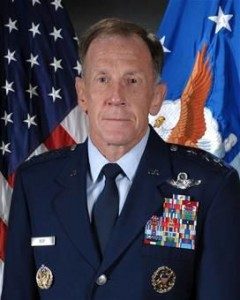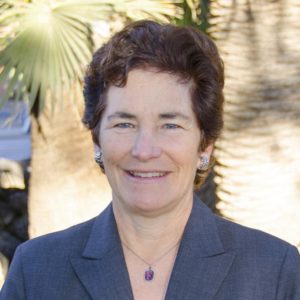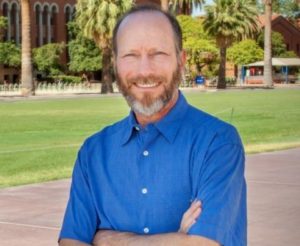Home to 7 military installations, the state of Arizona plays a critical role in U.S. national security and these installations are at the forefront of our national security infrastructure. Arizona is also increasingly vulnerable to the effects of climate change; these defense installations are no exception. Scholars from the University of Arizona writing in the scientific journal Climate Services, argue that the Department of Defense is inclined to prioritize the near-term threats over the long-term, looming changes like climate change.
On November 16, the American Security Project and University of Arizona will convene a panel of experts to discuss the recently published research led by University of Arizona faculty on the effects of climate change at Department of Defense installations, including Fort Huachuca and the Barry Goldwater Ranges. The paper focuses on both the barriers and the opportunities for climate adaptation within DoD.
The event will highlight the nexus between climate resilience and national security in Arizona and why climate action in Southern Arizona is imperative for American national security. The panel discussion will feature report authors Dr. Gregg Garfin and Professor Katharine Jacobs, contributors to the Climate Services journal article, Lt Gen Norm Seip, USAF, (Ret.), and Rear Admiral David Titley, USN, (Ret.).
About the Panelists
 Lieutenant General Norm Seip, USAF, (Ret.) served in the Air Force for 35 years. His last assignment was Commander of 12th Air Force, comprised of seven active-duty wings and two direct-reporting units in the Western and Midwestern United States. The fighter and bomber wings under his command possessed over 400 aircraft and had more than 33,000 active-duty military and civilian assigned personnel. He was a command pilot with more than 4,500 flying hours, primarily in fighter aircraft and has flown in support of numerous military operations and contingencies around the world.
Lieutenant General Norm Seip, USAF, (Ret.) served in the Air Force for 35 years. His last assignment was Commander of 12th Air Force, comprised of seven active-duty wings and two direct-reporting units in the Western and Midwestern United States. The fighter and bomber wings under his command possessed over 400 aircraft and had more than 33,000 active-duty military and civilian assigned personnel. He was a command pilot with more than 4,500 flying hours, primarily in fighter aircraft and has flown in support of numerous military operations and contingencies around the world.
He is an independent consultant focused on defense and national security related matters. He is a Senior Mentor for the Air Force and also serves, pro bono, as the Chairman of the Board, Council for a Strong America; Military Advisory Board, Truman National Security Project; National Security Advisory Council, U.S. Global Leadership Coalition; and International Advisory Board, 911 Fund.
 Rear Admiral David Titley, USN, (Ret.) is a Professor of Practice in Meteorology and a Professor of International Affairs at the Pennsylvania State University. He is the founding director of Penn State’s Center for Solutions to Weather and Climate Risk. After graduating from Penn State, Titley served as a naval officer for 32 years and rose to the rank of Rear Admiral. Dr. Titley’s career included duties as commander of the Naval Meteorology and Oceanography Command, and Oceanographer and Navigator of the Navy. While serving in the Pentagon, Dr. Titley initiated and led the U.S. Navy’s Task Force on Climate Change. After retiring from the Navy, Dr. Titley served as the Deputy Undersecretary of Commerce for Operations, the chief operating officer position at the National Oceanic and Atmospheric Administration.
Rear Admiral David Titley, USN, (Ret.) is a Professor of Practice in Meteorology and a Professor of International Affairs at the Pennsylvania State University. He is the founding director of Penn State’s Center for Solutions to Weather and Climate Risk. After graduating from Penn State, Titley served as a naval officer for 32 years and rose to the rank of Rear Admiral. Dr. Titley’s career included duties as commander of the Naval Meteorology and Oceanography Command, and Oceanographer and Navigator of the Navy. While serving in the Pentagon, Dr. Titley initiated and led the U.S. Navy’s Task Force on Climate Change. After retiring from the Navy, Dr. Titley served as the Deputy Undersecretary of Commerce for Operations, the chief operating officer position at the National Oceanic and Atmospheric Administration.
In 2017 Dr. Titley gave a TED talk on Climate Change and National Security that has been viewed over 850,000 times. He serves on numerous advisory boards and National Academy of Science committees, and currently chairs the National Academies of Science, Engineering and Medicine Climate Communication Initiative committee. He received an honorary Doctorate degree from the University of Alaska Fairbanks and is a Fellow of the American Meteorological Society.
 Prof. Katharine Jacobs is the Director of the Center for Climate Adaptation Science and Solutions (CCASS) at the University of Arizona. CCASS builds and supports climate change adaptation and assessment capacity, connects science with decision-making, and works with stakeholders to build collaborative, practical solutions to climate-related problems. Jacobs is a professor in Environmental Science and holds appointments in Geography and Regional Development and Hydrology and Water Resources. She was the director of the National Climate Assessment in the Obama Administration for four years and served as a White House water policy and adaptation advisor. She serves on a standing National Academies board, has been a chair or panelist on nine Academies committees, and serves on fifteen advisory committees.
Prof. Katharine Jacobs is the Director of the Center for Climate Adaptation Science and Solutions (CCASS) at the University of Arizona. CCASS builds and supports climate change adaptation and assessment capacity, connects science with decision-making, and works with stakeholders to build collaborative, practical solutions to climate-related problems. Jacobs is a professor in Environmental Science and holds appointments in Geography and Regional Development and Hydrology and Water Resources. She was the director of the National Climate Assessment in the Obama Administration for four years and served as a White House water policy and adaptation advisor. She serves on a standing National Academies board, has been a chair or panelist on nine Academies committees, and serves on fifteen advisory committees.
 Dr. Gregg Garfin is Associate Professor and Associate Extension Specialist in Climate Science, Policy & Natural Resources, in the University of Arizona’s School of Natural Resources and the Environment, as well as University Director of the Southwest Climate Adaptation Science Center. He works to bridge the science-society interface through dialogues between scientists and decision makers and collaborative climate and environment research projects. His research focuses on adaptation to a changing climate, climate variability, and drought. He was co-lead author for the Southwest chapter in the 2014 and 2018 National Climate Assessments. His recent projects include an assessment of National Park Service cultural resource vulnerability to climate extremes, and an investigation of best practices for assessing the costs of floods in North America.
Dr. Gregg Garfin is Associate Professor and Associate Extension Specialist in Climate Science, Policy & Natural Resources, in the University of Arizona’s School of Natural Resources and the Environment, as well as University Director of the Southwest Climate Adaptation Science Center. He works to bridge the science-society interface through dialogues between scientists and decision makers and collaborative climate and environment research projects. His research focuses on adaptation to a changing climate, climate variability, and drought. He was co-lead author for the Southwest chapter in the 2014 and 2018 National Climate Assessments. His recent projects include an assessment of National Park Service cultural resource vulnerability to climate extremes, and an investigation of best practices for assessing the costs of floods in North America.


 Lieutenant General Norm Seip, USAF, (Ret.) served in the Air Force for 35 years. His last assignment was Commander of 12th Air Force, comprised of seven active-duty wings and two direct-reporting units in the Western and Midwestern United States. The fighter and bomber wings under his command possessed over 400 aircraft and had more than 33,000 active-duty military and civilian assigned personnel. He was a command pilot with more than 4,500 flying hours, primarily in fighter aircraft and has flown in support of numerous military operations and contingencies around the world.
Lieutenant General Norm Seip, USAF, (Ret.) served in the Air Force for 35 years. His last assignment was Commander of 12th Air Force, comprised of seven active-duty wings and two direct-reporting units in the Western and Midwestern United States. The fighter and bomber wings under his command possessed over 400 aircraft and had more than 33,000 active-duty military and civilian assigned personnel. He was a command pilot with more than 4,500 flying hours, primarily in fighter aircraft and has flown in support of numerous military operations and contingencies around the world. Rear Admiral David Titley, USN, (Ret.) is a Professor of Practice in Meteorology and a Professor of International Affairs at the Pennsylvania State University. He is the founding director of Penn State’s Center for Solutions to Weather and Climate Risk. After graduating from Penn State, Titley served as a naval officer for 32 years and rose to the rank of Rear Admiral. Dr. Titley’s career included duties as commander of the Naval Meteorology and Oceanography Command, and Oceanographer and Navigator of the Navy. While serving in the Pentagon, Dr. Titley initiated and led the U.S. Navy’s Task Force on Climate Change. After retiring from the Navy, Dr. Titley served as the Deputy Undersecretary of Commerce for Operations, the chief operating officer position at the National Oceanic and Atmospheric Administration.
Rear Admiral David Titley, USN, (Ret.) is a Professor of Practice in Meteorology and a Professor of International Affairs at the Pennsylvania State University. He is the founding director of Penn State’s Center for Solutions to Weather and Climate Risk. After graduating from Penn State, Titley served as a naval officer for 32 years and rose to the rank of Rear Admiral. Dr. Titley’s career included duties as commander of the Naval Meteorology and Oceanography Command, and Oceanographer and Navigator of the Navy. While serving in the Pentagon, Dr. Titley initiated and led the U.S. Navy’s Task Force on Climate Change. After retiring from the Navy, Dr. Titley served as the Deputy Undersecretary of Commerce for Operations, the chief operating officer position at the National Oceanic and Atmospheric Administration. Prof. Katharine Jacobs is the Director of the
Prof. Katharine Jacobs is the Director of the 




